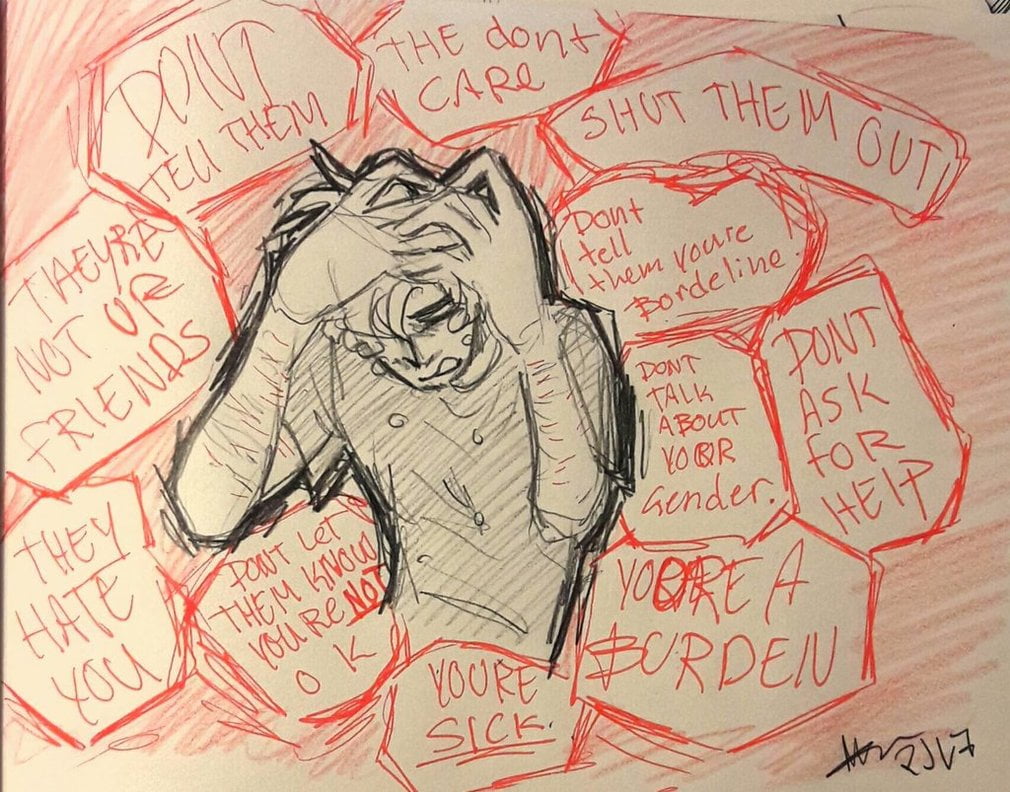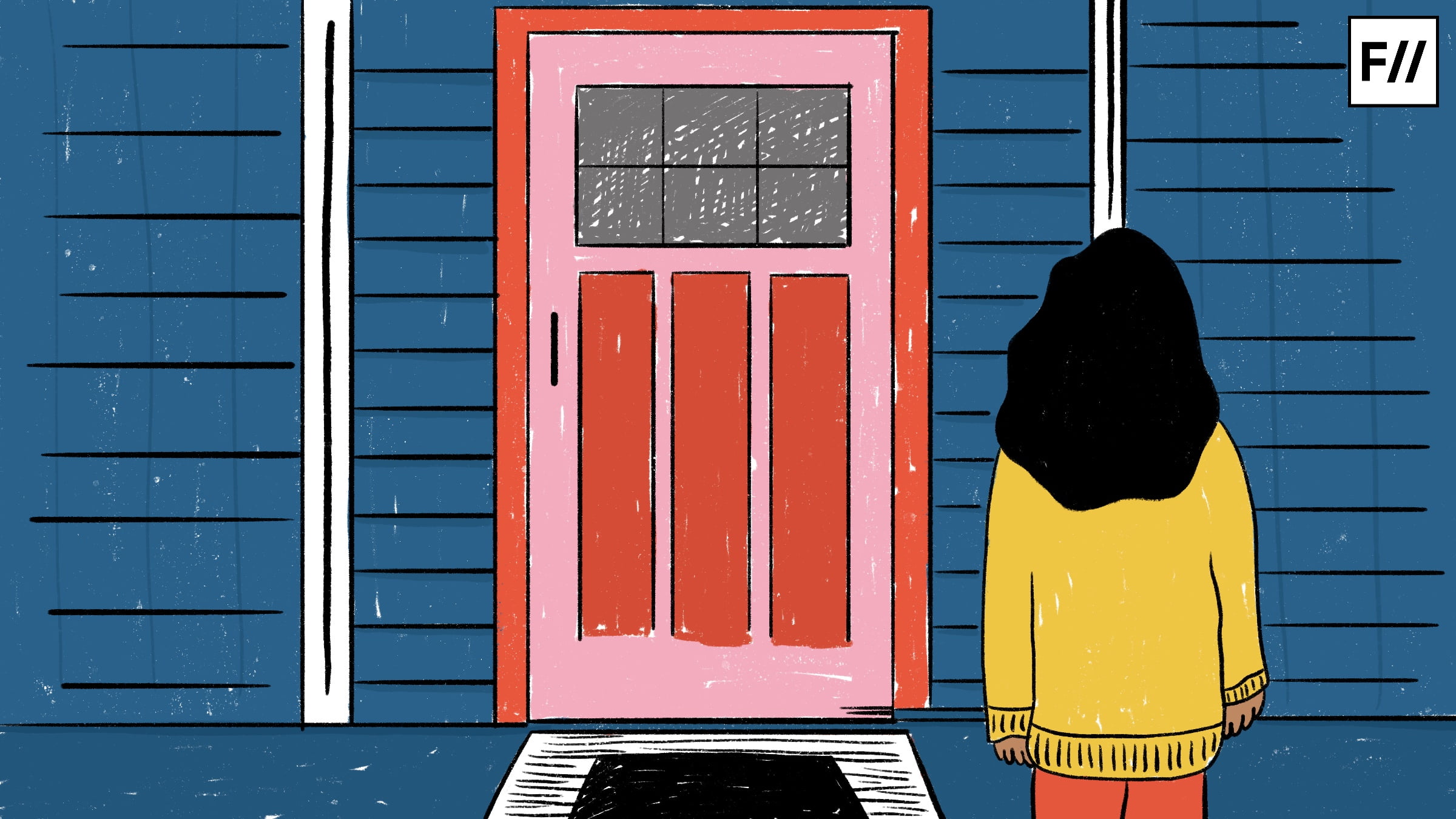What comes to your mind when I say domestic violence? Most probably, the picture of a physically assaulted person, battered and bruised. That, in many cases, is not true. Physical violence may not always be the part of all abusive relationships. Having no apparent signs of abuse does not mean one is not tortured. Men and women in intimate relationships suffer emotional abuse at the hands of their partners, which is in no way less destructive. Unfortunately, this form of domestic violence is often overlooked, trivialised, and discounted, even by the person suffering the abuse.
Owning to the complications involved in evaluating emotional abuse, researchers have found it difficult to steadily assess it. The creation of an accurate measurement process is hindered by the relatively insufficient availability of data and research on emotional abuse as compared to sexual or physical violence.
There are different techniques employed by the researchers to measure or define emotional abuse such as Conflict Tactics Scale, Abuse Behaviour Inventory, Psychological Maltreatment Inventory and the Women’s Experience with Battering Scale. All these studies concluded that emotional abuse is the most common form of Intimate Partner violence (IPV).
Moreover, the Intimate Partner & Sexual Violence Survey (NISVS) conducted in the US in 2011 revealed that approximately half of the American population has admitted experiencing emotional abuse by a partner at some point in their lives. A similar study conducted in India in the year 2016 reveals that around 28.33% of men and women are affected by emotional abuse in intimate relationships.
Let us understand what psychological abuse is, the various ways in which it is manifested and most importantly, the consequences of being in an emotionally abusive and unstable relationship.
Abuse, be it physical or emotional, is not a one-time event. It is a cycle that involves episodes of violence followed by apologies and loving gestures.
Emotional abuse can be identified as any form of non-physical behaviour that is used by the abuser to “control, suppress, punish, or isolate another person through the use of humiliation or fear”. It includes, amongst other behaviours – verbal assault, authority, control, isolation, taunting and exploitation of intimate details for derogation. Emotional abuse, early in the relationship, is sometimes considered a precursor to physical abuse but is not always the case.
Abuse, be it physical or emotional, is not a one-time event. It is a cycle that involves episodes of violence followed by apologies and loving gestures. This acute variation in the abuser’s behaviour is confusing for the victim and makes it difficult for them to leave the relationship. This ‘cycle of abuse’ works almost the same in all abusive relationships.
Also read: Emotional Rape: Insight, Aftermath And A Possible Solution
As soon as the abuse occurs, victims go through a period of extreme low self-esteem rendering it difficult for them to think rationally about the abuse and this ultimately ends up in them blaming and explaining themselves the reasons that might have caused their partners to behave the way they did. Everything settles in the days following the abuse with the abuser displaying normal behaviour, and life goes back to routine. As things get back to normal, the victim starts fantasising about the abuser becoming a better person and showing more sensitivity towards them. This fantasy is also a part of the cycle.
Not allowing the partner to go anywhere alone and justifying the same by saying they are being concerned and protective is being abusive.
This may not last long as the tension keeps building up. The abusers just need another reason that can trigger their violent behaviour again. As soon as something sets them off, there is another episode of shouting, name-calling, intimidation, threats, and humiliation, similar to the previous one. However, this is not the only form emotional abuse comes in. Sometimes the tell-tale signs of one category is an indication of the presence of others also. Let’s discuss some of these in detail.
1. Anger/Verbal Abuse
Anger is a form of emotional abuse. Your partner having an occasional outburst is one thing but you living with a constant fear at the back of your mind and confused as to what might set your partner off, is a completely different issue. Life of a person living with someone having extreme anger issues is just a long walk on eggshells to maintain the peace of their lives. An angry partner may verbally abuse with name-calling, putting the victim down by saying mean things about their appearance, education, background, and family, making the partner feel like he/she is ‘crazy’, is difficult to love and live with, and threatening to leave or divorce them.
An emotional abuser also uses “symbolic violence” to intimidate the victim by using gestures, looks, and actions. These include smashing things, destroying personal belongings, throwing around objects, using threats to harm children or take the children away, and driving recklessly while the victim is inside the car.
An interesting thing about anger is that it always begins and ends with a blame game. Emotional abusers accuse their partners for being the reason of their anger, even after acknowledging and accepting the depravity of their behaviour. Such people blame their partners for pushing their buttons and testing their patience. Angry and abusive people can easily make themselves look like victims in the whole situation and hence find it easy to victimise others as well.
Emotional abusers accuse their partners for being the reason of their anger, even after acknowledging the depravity of their behaviour.
As adults in a relationship, there should always be an option to ‘talk things out’, discuss difficult issues, and find out solutions. When one partner constantly uses anger and intimidation to suppress and disregard other partner’s thoughts and concerns, the relationship is abusive beyond doubt.
2. Isolation
A typical sign of an abusive relationship is your partner trying to keep you away from your emotional support, be it your family or friends. In this situation the victim loses their freedom of movement and personal space completely. Not allowing the partner to go anywhere alone and justifying the same by saying they are being concerned and protective is being abusive.
The victim has to keep the partner informed of their whereabouts all the time and any association with family or friends, be it a call or a meeting has to be done in the partner’s presence. It is very easy for people around to identify isolation but the victim covers up for the abuser, sometimes because they themselves are unaware of the trick being played or they are too scared to rebel against it.
In extreme cases the abusers turn to stalking the partner. This is done by monitoring the victim’s activities, stalking them on social media, spying on the online activity or using other techno-stalking methods to serve their prying. A New York Times report tells us that smart home technology, such as locks, speakers, thermostats, lights and cameras are now being used to harass and control the victims.
It is unethical and immoral for anyone to disconnect a person from their family and friends. If your partner is deciding for you, when and how often should you be seeing your family and friends, or is trying to regulate your freedom of movement, it is time to check this abuse.
3. Economic/Financial Abuse
Economic abuse is extremely common in marriages. Only one partner has control over all the assets and the underlying objective is obvious – to keep the spouse financially dependent to maintain their subordinate position and to make it difficult for them to leave the union despite the abuse.
When a situation is created in a marriage where one spouse does not have access to the liquid assets and they are dependent on their partner even to buy things for their personal use, financial abuse is explicit. Every expenditure is vigorously computed. Even purchases at the grocery stores are meticulously monitored, with just enough money given to complete the monthly task of maintaining the budget. All other expenses, be it health care, clothing, or occasional outings, are discouraged.
Everything that should or shouldn’t be bought in the house, is never decided by the victim. Most of the victims have either a vague or absolutely no idea of their partners’ earnings and how or where the money is being spent. Even when the victim is working, they do not have control over their earnings. They are made to ask for money and are occasionally provided with an inflexible and insufficient amount of allowance.
People who are emotionally abused tend to show physical and mental health issues that affect their quality of life and their other relationships.
Like any other form of abuse, financial abuse is also more common in patriarchal societies. The women in the family are treated as servants with all the domestic work (cooking, cleaning, laundry, dishes, groceries and childcare) of the family being their default duty which they have to perform, in health and in sickness, with a smile.
Most women in such relationships are made to work in the house with absolutely no regard for their hard work. They manage between domestic work and taking care of the children all alone. As part of the financial abuse the victims are discouraged from taking up a job or going outside for work, but are still occasionally notified that they’re a liability for not making any ‘financial contribution’ in the family.
You are not a child who should be given a supervised monthly allowance and neither an employee hired to do the domestic chores and raise children in return of the so-called security of a marital bond. As an equal partner you should also have a balanced control over all the marital assets. If this is not the case, beware.
4. Silent Abuse
Not all kinds of abuse involve shouting or criticism. Sometimes an emotionally unavailable partner does a lot of damage to your mental health. Such people are always disengaged, distracted and are preoccupied all the time with their own life. These kind of people are usually workaholics. A disengaged partner would say “You live your life and let me live mine”.
Any sense of paucity that they might feel in the relationship, they’ll deal with it by simply not making an effort. These kind of relationships are usually vague and inconsistent. Initially in the relationship the partner showers all the love and attention, makes big plans and promises, discusses things important to you, tries to know your feelings about things, and shows interest in your life. All this begins to gradually fizzle out. The only thing that may interest the partner is the physical aspect of the relationship and hence no kind of emotional investment is made by them. This brings insecurity in the relationship and little to no emotional attachment is left.
An emotionally unavailable partner also comes across as cold and insensitive. They find it difficult to show any kind of empathy or concern. All the emotions are dismissed as ‘emotional drama’. Being in a relationship with such people means you’re left to feel lonely most of the time. Even when they know you need them, they’ll not bother to check on you and show no signs of compassion or care. This leaves the victim feeling unseen and unheard.
Love in a relationship does follow the barter system. A partner who is not ready to reciprocate your love, care, and attention, is definitely being abusive.
Consequences of Suffering Emotional Abuse in Intimate Relationships
It is highly likely that emotionally abused people blame themselves. When the abuse is not apparent in the form of physical injuries, the victim keeps guessing what went wrong.
A partner’s rage or emotional manipulation may not begin with any prerequisites. This is confusing and damaging at the same time. The absence of a caring and respectful partner may leave the same corrosive impact on mind as physical abuse does. People who are emotionally abused tend to show physical and mental health issues that start affecting their quality of life and their other relationships. Anxiety, depression, chronic pain, alcoholism or drug dependence, and other stress-related problems are common in victims of emotional abuse.
When people decide to leave an abusive relationship, they require a support system, love, safety, and psychological assistance.
The abusers are usually smart. They, in order to have control and power on their side, will keep targeting the victim by pointing out their minute and avoidable mistakes, will make a mountain out of molehill, will blame them for everything that goes wrong in the life in general. Even a faulty refrigerator is the victim’s fault. These are nothing but tactics of manipulation to make the victim go into a phase of self-doubt, low self-esteem and lack of confidence. A more technical term for which is ‘gaslighting’.
This can get so vicious over a period of time, that the victim starts getting profound emotions of inefficacy and uselessness. They lose confidence to do anything on their own. They begin to live a life where they would do things only to get their partner’s validation. Not making any mistakes and avoiding any criticism from their partner becomes their ultimate aim in life. Victims in this process lose their own identity completely.
It is true that it’s difficult to leave abusive relationships. It is difficult to live without the abuse when one has become habitual of dealing with it. The abuse is addictive. It’s difficult to live without the person whose validation is all it takes to make your existence worthy and meaningful. As people in abusive relationships are continuously made to feel worthless, it is difficult for them to see a life beyond that relationship. They begin to feel that they deserve this treatment and fail to identify that the problem is not them but their abuser. The honeymoon phase of love and affection that comes right after every episode of abuse, brings a lot of hope for the victim, again making it difficult for them to take any decision.
Also read: Gaslighting: A Personal Account Of Self Perception
It is also hard to break-up ‘safely’ as there will be consequences. An abusive partner is very likely to seek revenge. Making use of the partner’s intimate details to threaten and blackmail, stalk, harm the children and family members, and a lot of times even killing the victim, are all very common post-breakup customs. In some cases, the partner might threaten to hurt or kill themselves in order to manipulate the victim to stay in the relationship. There is always pressure from the society to save the relationship, no matter how traumatising living with it is. Only the wearer knows where the shoe pinches, but still everyone has an opinion on other people’s lives.
Every person should have the right to decide what they want from their lives. If one has the right to decide who their partner should be, they should also have the right to decide if they want to continue their lives with them or not. It is a difficult decision and that’s why it should be respected. When a person decides to leave an emotionally abusive relationship, there starts a difficult phase of transition that requires rebuilding lives and moving on. All they need then is a support system, love, safety and psychological assistance.
References
Black MC, Basile KC, Breiding MJ, Smith SG, Walters ML, Merrick MT, et al. The National Intimate Partner and Sexual Violence Survey (NISVS): 2010 Summary Report.
Engel B. The emotionally abusive relationship: How to stop being abused and how to stop abusing. New Jersey: John Wiley and Sons; 2002.
Bharat A et al. International Journal of Community Medicine and Public Health. 2016; 3(4):818-825
Yumna Asaf has recently done her PhD from the Advanced Centre for Women’s Studies of Aligarh Muslim University, Aligarh. She has worked in the area of Violence against women and International Law. Papers written by her have been part of national and international conferences, including three prestigious conferences in the United States. Besides her research work, Yumna loves cooking, painting, travelling, Sufi music and reading Urdu poetry.
Featured Image Source: Deviant Art
About the author(s)
Guest Writers are writers who occasionally write on FII.





What about the men who face such issues??
Please notice that the language of the article is gender neutral and statics mentioned in the article also highlight how both and women are victims of emotional abuse.
A bit controversial but I can I just say as Indians, a lot of us go through emotional abuse from our parents and this is largely normalised by Indian society. ”Elders are always right”, ” always listen to your elders”. I do believe Indian parents are extremely hardworking, loving and supportive – but their means of controlling behaviour often crosses the boundary to emotional abuse.
Thoughts…?
Excellent evaluation on particular issue, I have just suggest you one angle of in the len of gender neutral way, maintance of social prestige for newcomer, it is also one of the analysis issue to abuser in term of gaslighing
hello,
i want legal advice for the same. will you please help me?
i dont know where to go, whom to meet to fight against my father and his brother family, scold and turture mentally? plz guide, domestic environment has already spoiled my one year of career, can i file case directly into the supreme court under section 32?
pankaj.mairwa@gmail.com